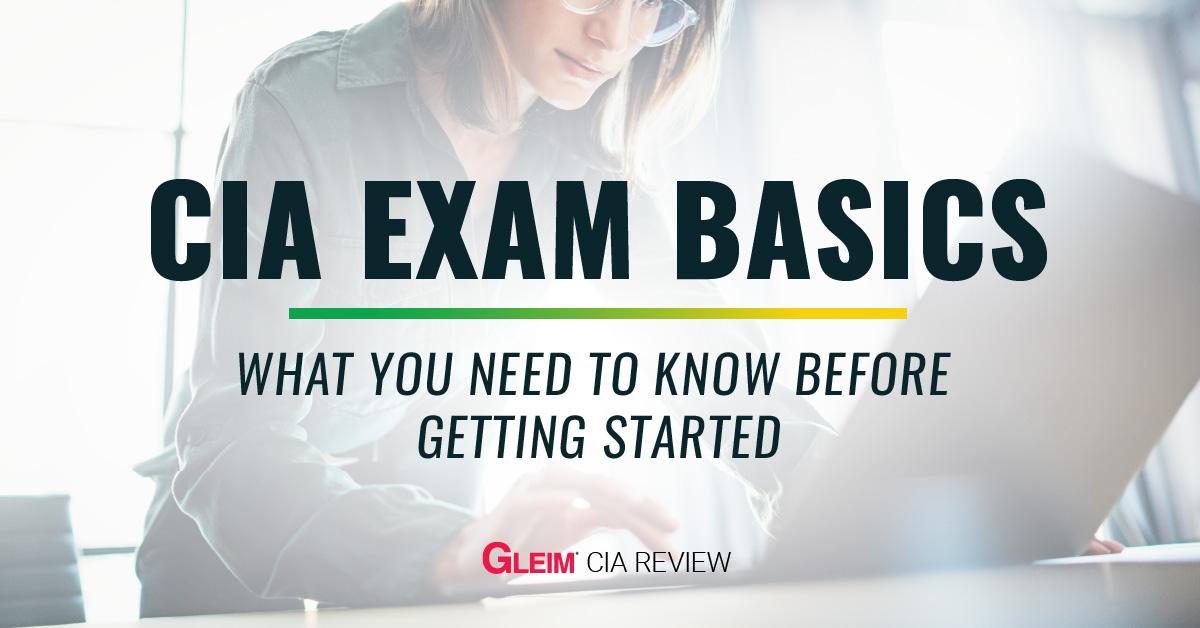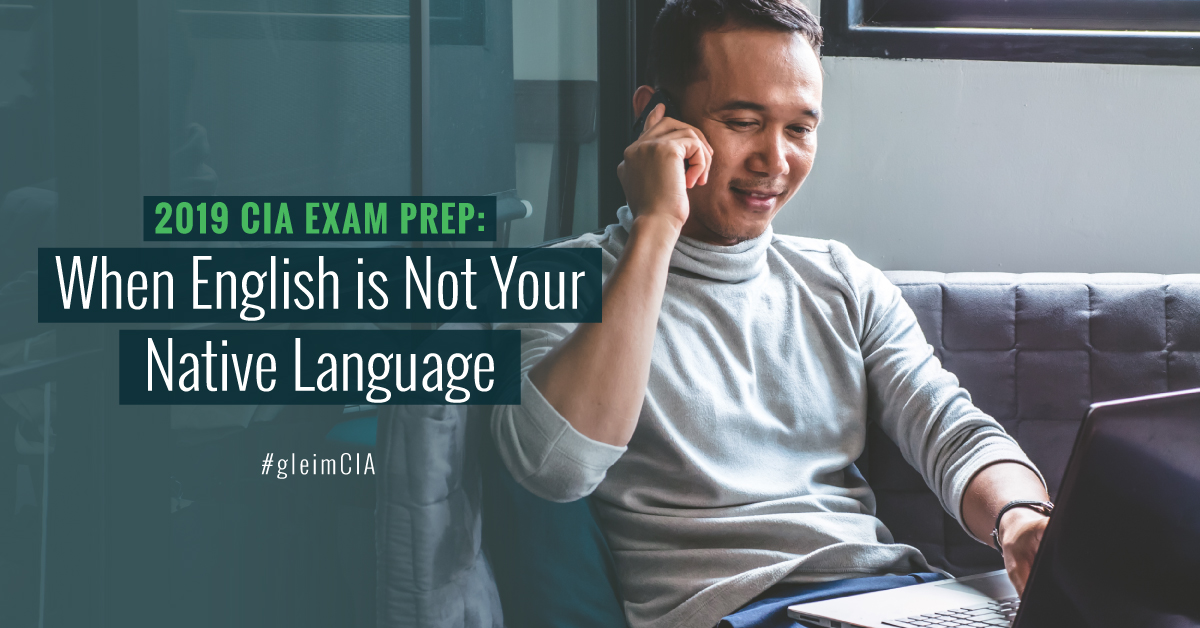Becoming a Certified Internal Auditor (CIA) is a great way to enhance your auditing career. The benefits of earning the CIA certification include increased job opportunities, earning potential, and respect, but before you receive these advantages, you must meet the requirements established by The Institute of Internal Auditors (IIA). The process takes time, effort, and money, but you don’t have to worry about that just yet. Instead, take the first step toward the CIA certification by learning the qualifications to become a Certified Internal Auditor.
Contents
- Qualifications to Become a Certified Internal Auditor
- Continuing Professional Education
- Variations in CIA Qualifications
- CIA Requirement Exemptions
- Exam Prep for Becoming a Certified Internal Auditor
Qualifications to Become a Certified Internal Auditor
To secure the CIA certification, you have to satisfy the following requirements in the proper order. There are four total, known collectively as the Four E’s: Education, Ethics, Examination, and Experience. You must satisfy all four CIA program requirements within a four-year eligibility period (explained in greater detail later).
Per The IIA, unless you’re a student, you must achieve the education and ethics requirements prior to completing the examination requirement (students are eligible to sit for the CIA exam in their senior year). You may complete the experience requirement at any time, but many candidates choose to pass the CIA exam first if they haven’t already met the experience requirement before discovering the CIA.
Now let’s take a look at each of the “Four E’s” in greater detail.
Education
The first qualification for becoming a CIA is fulfilling the education requirement. Recently, The IIA changed this requirement to better account for the wide scope of educational backgrounds among potential CIA candidates. Before, all candidates needed a bachelor’s degree, but now The IIA has made certification possible for those with an associate’s degree (or equivalent) and those with no post-secondary education at all! The table below explains the new education requirements for candidates.
CIA Education Requirements
|
For Candidates With Post-Secondary Education |
|
|---|---|
|
In North America |
Outside North America |
|
Bachelor’s degree (or higher) |
Three- or four-year post-secondary degree (or higher) |
|
Associate’s degree |
A-Level certificate or equivalent |
|
For Candidates Without Post-Secondary Education |
|---|
|
Candidates who possess seven years of verified experience in internal auditing (or equivalent) may become eligible subject to approval. |
Common associate’s degree equivalents recognized by The IIA include:
- Foundation Degree
- Diploma of Higher Education
- Higher National Diploma
To prove that you possess an acceptable degree, you must supply The IIA with one of the following documents:
- Copy of your degree or official transcripts
- Letter from a university confirming degree
- Letter from evaluation services confirming degree level
Note: If your name has changed since you earned your degree, you must also include your legal name change document.
Ethics
The IIA holds CIA candidates to a high moral and professional standard, outlined in its Code of Ethics. To become a CIA, you must agree to abide by this Code of Ethics. You must also have an IIA-certified individual, your supervisor, or your professor sign the Character Reference Form to verify that you meet the ethics requirement.
Examination
Passing the CIA examination is one of the certification’s most demanding requirements. The CIA exam contains three parts, hundreds of questions, and hours of testing time, all of which are detailed in the table below.
CIA Exam Format
|
Part |
Title |
Number of Questions |
Testing Time |
|---|---|---|---|
|
Part 1 |
Internal Audit Basics |
125 multiple-choice |
2.5 hours |
|
Part 2 |
Internal Audit Practice |
100 multiple-choice |
2 hours |
|
Part 3 |
Internal Audit Knowledge Elements |
100 multiple-choice |
2 hours |
|
Total |
325 questions |
6.5 hours |
The CIA exam covers a vast array of internal auditing topics. Currently, Part 3 addresses the greatest amount of content; however, beginning January 1, 2019, the exam will change to better test the knowledge and skills required of current internal auditors. At this point, the exam syllabi will shift to more evenly distribute the content across all three parts.
To take the CIA exam, you must:
-
- Create a profile in The IIA’s Certification Candidate Management System (CCMS)
- Use the CCMS to apply to the CIA Certification Program.
- Register online for the part of the exam that you want to take.
You will receive authorization to take the exam from The IIA, at which point you will have 180 days to sit for that exam part. - Wait 48 hours from the time you receive your “Authorization to Test” email from The IIA.
- Schedule your test with Pearson VUE, which you can do via their website or by phone.
If you plan to start the CIA certification process as soon as possible, we recommend passing as many parts of the exam as you can in 2018 before the changes come in 2019. You still have time, especially when you rely on the #1 CIA review course to prepare for the exam.
To be thoroughly prepared for each part of the exam, we suggest the following number of study hours:
- Part 1: 55-60 hours
- Part 2: 55-60 hours
- Part 3: 120 hours
If you commit now, purchase a review course, and make a study schedule, you can knock out this CIA requirement before 2018 ends. Even if you don’t finish before the new exam version arrives, you’ll have made great progress toward passing the exam and will be that much closer to obtaining the CIA certification. Any part(s) you pass on or before December 31, 2018, will carry over and count toward completing the exam in 2019.
Experience
The final major requirement you must observe to become a CIA is the experience requirement, which involves working in internal auditing or its equivalent for a certain number of months. The amount of work experience you must have for CIA certification depends on the level of education you’ve achieved (outlined in the table below).
CIA Experience Requirement
|
Educational Level |
Work Experience Required |
|---|---|
|
Master’s degree or equivalent |
12 months |
|
Bachelor’s degree or equivalent |
24 months |
|
Associate’s degree, A-Level certificate, or equivalent |
60 months |
Additional Requirements
There are a few other obligations you must fulfill to earn the CIA. However, these requirements don’t call for as much time or effort on your part, so we’ve grouped them separately.
-
- Proof of Identification
Before you can receive approval for your CIA certification program application, you must submit proof of identification in the form of your official passport or national identification card. The IIA only accepts current documents, so none of these can be expired. This documentation must be scanned and uploaded through the Document Upload Portal in such a way that the picture is clearly legible. - Confidentiality
Like many professional certification exams, the CIA exam is non-disclosed. Therefore, entrance into the CIA program depends in part on your agreeing to keep the contents of the exam confidential. You are required to sign a non-disclosure agreement at your testing appointment before you will be allowed to take the exam.You will only ever be allowed to discuss the exam content with The IIA’s Certification Department. Disclosing exam information under any other circumstances is a Code of Ethics breach that could result in program disqualification. - Eligibility Period
Once The IIA officially accepts you into the CIA program, you have four years to finish the program by completing every eligibility requirement discussed above. If you do not become certified in your 4-year window:
- Proof of Identification
- Your program eligibility will expire,
- You will have to reapply to the program, and
- You must retake any exam parts you passed in your previous eligibility period.
If necessary, you can avoid these consequences by applying for an eligibility extension. There are three different types of extensions: hardship extension, non-hardship program extension, and exam eligibility extension. Each of these extensions include their own procedures and fees, which you can learn more about in the IIA Certification Candidate Handbook.
Continuing Professional Education
To maintain your CIA status, you must earn 40 hours of continuing professional education (CPE) each year. This requirement ensures that your knowledge and skills stay strong and your information about the profession remains current. However, you won’t need to address the CPE requirement right away. The IIA awards 40 CPE hours to candidates the year they earn the certification and 40 CPE hours the following year. With 80 CPE hours accounted for, you can wait until your third year of certification to start earning your CPE.
Variations in CIA Qualifications
In some countries, The IIA affiliates administer the CIA exam, and the certification processes, pricing, and taxes may vary. For example, CIA candidates residing in South Africa and the United Kingdom/Ireland must be members of The IIA branches within their respective countries. According to the CIA Candidate Handbook, if you live in one of the countries listed below, you’ll need to refer to your local IIA Institute website or contact your local representative to discover the specifics of your CIA journey.
- Belgium
- Brazil
- China
- Chinese Taiwan
- Czech Republic
- Indonesia
- Japan
- Korea
- Malaysia
- South Africa
- Switzerland
- Thailand
- United Kingdom/Ireland
CIA Requirement Exemptions
If you’re already a member of the Association of Chartered Certified Accountants (ACCA) or a Certified Public Accountant (CPA), we’ve got great news! You may be exempt from the CIA education and experience requirements.
The Professional Certification Board (PCB) has determined that the experience requirements for ACCA members and the education requirement for U.S. CPAs meet and/or exceed these requirements for the CIA program. Therefore, the PCB has approved work experience and education exemptions for qualified ACCA members and education exemptions for U.S. CPAs.
To be considered for these exemptions, you must simply complete the appropriate fields on the CIA application. The status of your CIA application will be pending while certification administrators confirm that your membership or license is active. But even if you have to wait a little longer for CIA program approval, you won’t have to wait as long for CIA certification thanks to these exemptions!
Exam Prep for Becoming a Certified Internal Auditor
While you may be on your own with some of these requirements, you don’t have to take on the CIA exam alone. Instead, you can trust the most widely-used CIA review course to help you achieve exam success. Gleim CIA Review is not only the course more candidates turn to than any other, but it was also the first on the market. Gleim CIA has more experience with CIA exam changes (like the ones coming in 2019) than any other provider. We’ve used this experience to make the most comprehensive course available so that you can pass with confidence. Because it meets all of these qualifications, Gleim CIA Review is the #1 CIA exam prep, and provides everything you need to pass the CIA exam. Learn more about the process of passing and the course that will get you there by accessing our free CIA exam guide today!



